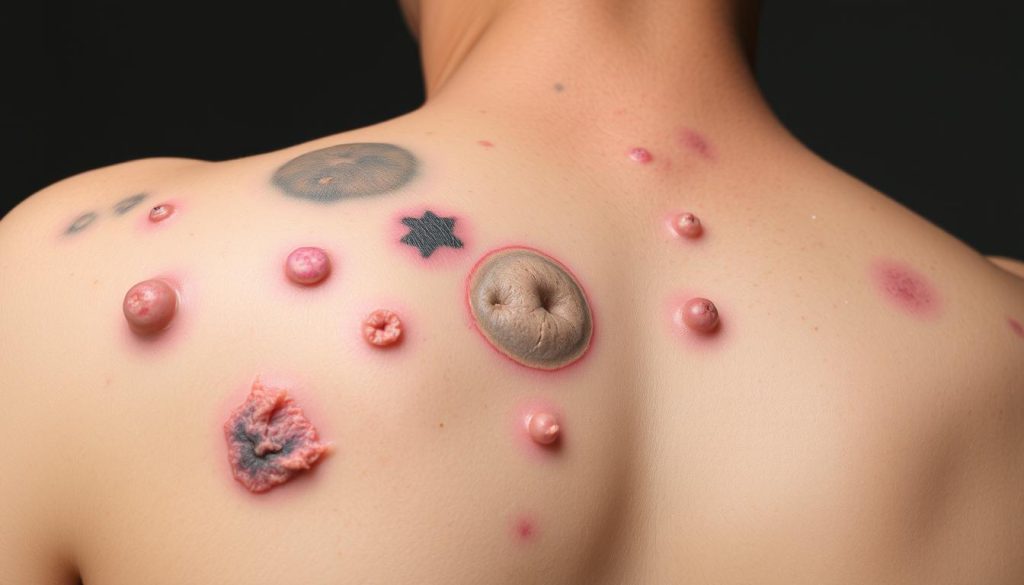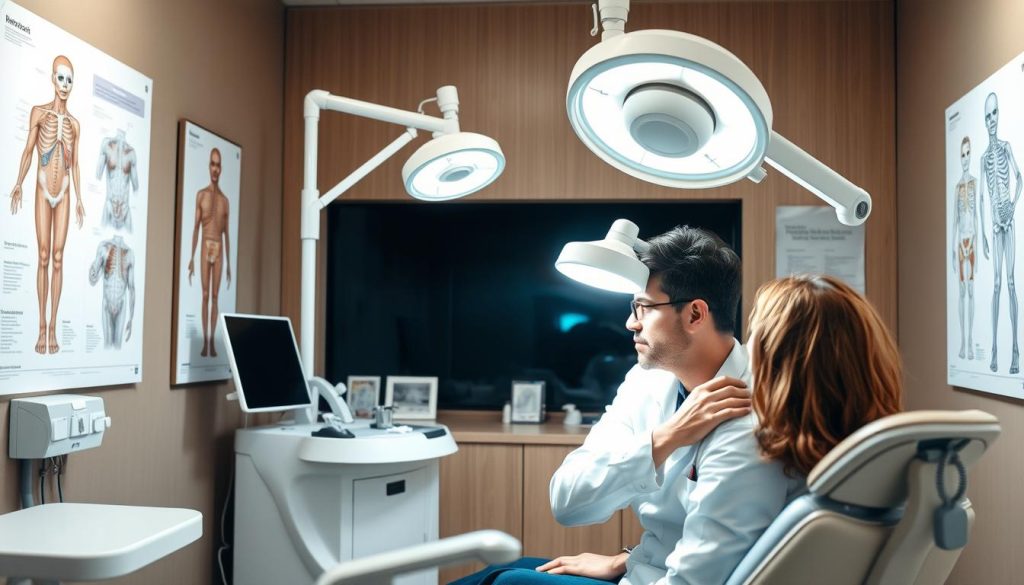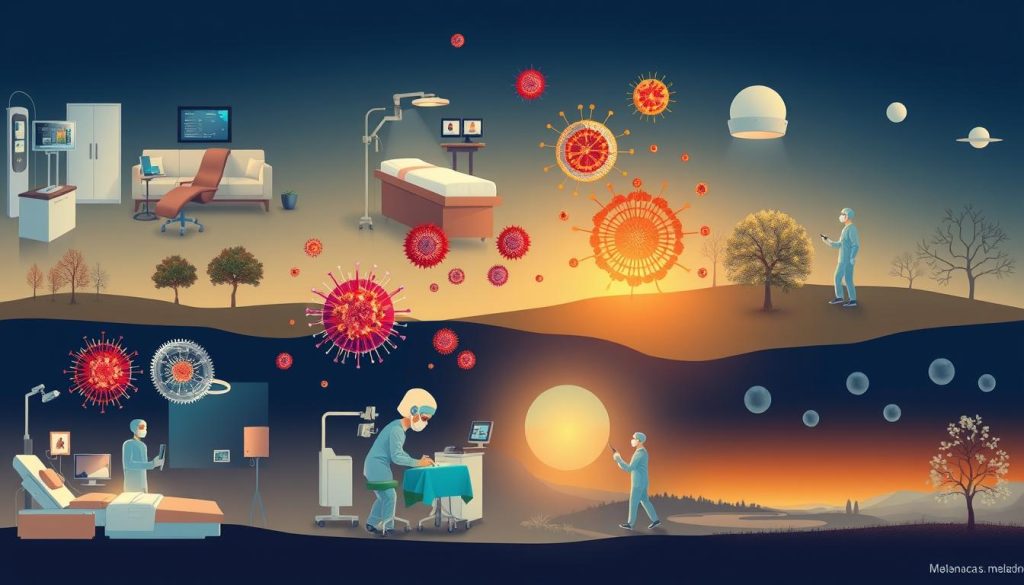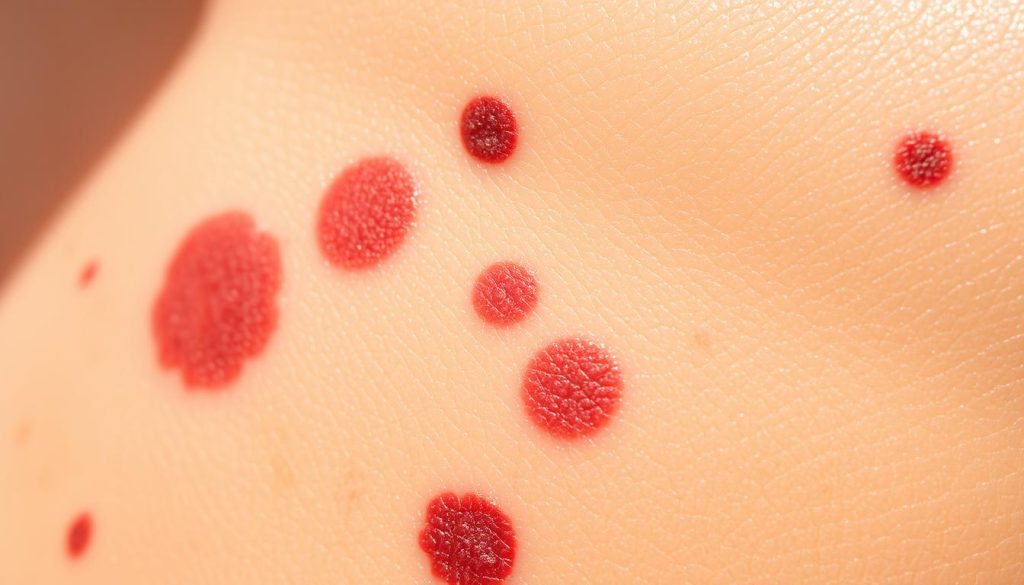Skin cancer is a big problem in the United States, hitting millions every year. Catching it early is key to beating it and living longer. Knowing the signs and risks can help you keep your skin safe.
Look out for small changes in moles or new growths. This guide will cover skin cancer types, like melanoma, and what makes you more likely to get it.
Learning how to spot skin cancer early and how sun affects your skin can help protect you and your family. Let’s explore how paying attention can save lives.
Understanding Skin Cancer: Types and Prevalence
Skin cancer has different forms, each with its own traits. Knowing these types is key to catching it early. Let’s look at the three main types: basal cell carcinoma, squamous cell carcinoma, and melanoma.
Basal Cell Carcinoma: Most Common Form
Basal cell carcinoma is the most common skin cancer. It starts in the basal cells of the skin’s outer layer. This type rarely spreads but can grow deep if left untreated. Look for shiny, pearly bumps or sores that won’t heal.
Squamous Cell Carcinoma: Characteristics and Risk Factors
Squamous cell carcinoma develops in the upper layers of skin. It’s more likely to spread than basal cell carcinoma. Watch for scaly red patches, open sores, or wart-like growths. People with light skin or those exposed to UV rays are at higher risk.
Melanoma: The Most Dangerous Type
Melanoma is the most serious form of skin cancer. It starts in pigment-producing cells called melanocytes. Melanoma can appear as new moles or changes in existing ones. Early detection is key as it can spread quickly to other parts of the body.
| Skin Cancer Type | Prevalence | Key Features |
|---|---|---|
| Basal Cell Carcinoma | 80% of skin cancers | Slow-growing, rarely spreads |
| Squamous Cell Carcinoma | 16% of skin cancers | Can spread if untreated |
| Melanoma | 4% of skin cancers | Most dangerous, can spread rapidly |
Knowing about these skin cancer types helps us spot signs early. Regular skin checks and sun protection are vital to prevent and catch skin cancer early.
Common Risk Factors for Developing Skin Cancer
Skin cancer can affect anyone, but some factors increase your risk. Knowing these can help you protect yourself.
UV radiation is the main cause of skin cancer. Too much sun exposure can damage skin cells, leading to cancer. People with fair skin are more at risk because they have less melanin to protect against UV rays.
Your family history is also important. If your relatives have had skin cancer, you’re at higher risk. This means you should watch your skin closely and protect it from the sun.
Being immunosuppressed, due to medical conditions or treatments, also raises your risk. When your immune system is weak, it can’t fight off abnormal cell growth as well.
- Frequent sunburns, specially in childhood
- Regular tanning bed use
- Living in sunny or high-altitude areas
- Having many moles or atypical moles
- History of precancerous skin lesions
Age is another factor. As you get older, your skin has been exposed to more UV rays, raising your risk. Men are also more likely to get certain types of skin cancer, possibly because they get more sun over time.
By knowing these risk factors, you can take steps to protect your skin. Regular self-exams and visits to the dermatologist are key, even more so if you have several risk factors.
The ABCDE Rule of Melanoma Detection
The ABCDE rule is key for checking moles and finding melanoma early. It’s simple to remember and helps you catch skin cancer signs early. Let’s explore each part of the rule to help you stay on top of your skin health.
Asymmetry: What to Look For
Look at your moles for uneven shapes. Healthy moles are symmetrical. If you draw a line through the middle, both sides should look the same. Moles that don’t match need more attention.
Border Irregularity: Warning Signs
Check the edges of your moles. Normal moles have smooth borders. If the edges are jagged or blurry, it could be melanoma. Watch for notched or scalloped edges.
Color Variations: Understanding Changes
Healthy moles usually have one color. Be careful of moles with different shades of brown, black, or tan. Red, white, or blue spots in a mole are also a warning sign.
Diameter: Size Matters
Measure your moles. Most benign moles are smaller than 6mm (like a pencil eraser). Larger moles should be watched closely, as melanomas often grow bigger.
Evolution: Tracking Changes Over Time
Watch for changes in your moles. Any changes in size, shape, color, or symptoms like itching or bleeding need a doctor’s visit.
| ABCDE Rule | What to Look For | Action |
|---|---|---|
| Asymmetry | Uneven shape | Compare both halves |
| Border | Irregular edges | Check for jagged lines |
| Color | Multiple shades | Note any variations |
| Diameter | Larger than 6mm | Measure size |
| Evolution | Changes over time | Track differences |
The ABCDE rule is a guide for finding melanoma. Regular self-exams with this rule can catch issues early. If you see any concerning changes, get medical advice right away.
Warning Signs That Shouldn’t Be Ignored
Spotting skin cancer early is key to successful treatment. Knowing your skin and when to see a doctor is important for your health.

Unusual Skin Growth Patterns
Watch for new moles, bumps, or patches that stand out. If they grow, change shape, or color fast, see a dermatologist.
Changes in Existing Moles
Stable moles can change. Look for size, shape, or color changes. Moles that are not symmetrical, have irregular edges, or show many colors need a doctor’s check.
Non-Healing Sores
Most skin injuries heal in weeks. But, sores that don’t heal for over a month might be cancer. They might bleed a lot or keep scabbing without healing.
If you see these signs, don’t worry, but see a skin specialist. Catching skin problems early can lead to better treatment and outcomes.
The Impact of UV Radiation on Skin Health
UV radiation is a big threat to our skin. Every day, our skin is exposed to these invisible rays. This can cause lasting damage.
Sun damage happens when UV rays get into our skin. They change our skin cells at a deep level.
UV radiation makes our skin age faster. This is called photoaging. It leads to wrinkles, age spots, and a leathery feel. The sun breaks down collagen and elastin, which are important for keeping our skin firm and elastic.
The worst part is DNA damage from UV radiation. When UV light hits our skin cells, it can change their genetic material. These changes can lead to skin cancer if not treated. The risk goes up with each sunburn and the more sun we get over time.
| UV Radiation Type | Effects on Skin | Protection Methods |
|---|---|---|
| UVA | Premature aging, deeper skin damage | Broad-spectrum sunscreen, protective clothing |
| UVB | Sunburn, surface skin damage | SPF 30+ sunscreen, shade during peak hours |
| UVC | Typically blocked by ozone layer | Not a significant concern for skin health |
Knowing how UV radiation affects our skin shows why protecting ourselves is key. By shielding our skin, we can lower the risk of sun damage. This helps keep our skin healthy for a long time.
Essential Steps for Monthly Skin Self-Examination
Regular skin self-exams are key for catching skin cancer early. A monthly check can help you spot skin changes and find issues early. Learn about the tools, techniques, and ways to document your skin self-exam here.
Tools Needed for Self-Examination
To do a thorough skin self-exam, you’ll need:
- Full-length mirror
- Hand-held mirror
- Bright lighting
- Body map or diagram
- Camera or smartphone
Proper Examination Techniques
Begin your body examination in a well-lit room. Check your entire skin, including hard-to-see spots. Use mirrors to see your back, scalp, and other tricky areas.

Documentation Methods
Mole mapping is vital for tracking changes. Use a body diagram to mark moles, freckles, and other skin marks. Take clear, close-up photos of any concerning areas for future comparison.
This documentation helps you and your doctor keep an eye on any changes. By following these steps monthly, you’ll get to know your skin better. This way, you can notice any suspicious changes early. Remember, catching skin cancer early is the best defense.
Prevention Strategies and Sun Protection Methods
Skin cancer prevention starts with smart sun safety habits. Protecting your skin from harmful UV rays is key to reducing your risk. Let’s explore effective strategies to keep your skin healthy and cancer-free.
Sunscreen is your first line of defense. Choose a broad-spectrum product with an SPF of 30 or higher. Apply it generously to all exposed skin, including often-forgotten areas like ears and feet. Reapply every two hours or after swimming or sweating.
Protective clothing is another key part of sun safety. Wear long-sleeved shirts, long pants, and wide-brimmed hats when outdoors. Look for clothing with built-in UV protection for extra shielding.
Seeking shade is a simple yet effective way to reduce sun exposure. Plan outdoor activities for early morning or late afternoon when the sun’s rays are less intense. Use umbrellas, trees, or canopies to create shaded areas when outdoors.
| Sun Protection Method | Benefits | Best Practices |
|---|---|---|
| Sunscreen | Blocks UV rays, reduces sunburn risk | Apply 15-30 minutes before sun exposure, reapply every 2 hours |
| Protective Clothing | Physical barrier against UV rays | Choose tightly woven fabrics, darker colors for better protection |
| Shade | Reduces direct sun exposure | Seek shade between 10 AM and 4 PM when UV rays are strongest |
Remember, combining these sun protection methods offers the best defense against skin cancer. Make sun safety a daily habit to keep your skin healthy for years to come.
When to Schedule a Professional Skin Screening
Regular skin cancer screenings are key for early detection and prevention. Knowing when to schedule these exams is vital for your skin health.
Frequency Recommendations by Risk Level
The need for professional skin exams varies by risk. Here’s a basic guide:
- Low risk: Annual skin cancer screening
- Moderate risk: Every 6-12 months
- High risk: Every 3-6 months
Risk factors include fair skin, family history of skin cancer, many moles, and too much sun. Talk to your dermatologist to find out your risk and the best screening schedule.

What to Expect During a Screening
A professional exam involves a detailed skin check. Your dermatologist will look for any odd moles, growths, or changes. They might use a dermatoscope, a tool for a closer look.
During the screening, you should:
- Undress to your underwear
- Point out any concerns or changes you’ve noticed
- Answer questions about your sun exposure and family history
If needed, your dermatologist might suggest a biopsy of suspicious areas. Remember, regular skin cancer screenings are essential for your skin health and catching issues early.
Advanced Diagnostic Techniques for Skin Cancer
Doctors use the latest methods to find skin cancer early. These tools help them see things the naked eye can’t. Let’s look at some key techniques that save lives.
Dermoscopy Examination
Dermoscopy uses a special magnifying tool. It lets doctors see skin lesions up close. This technique spots tiny changes in moles or growths. It’s painless and quick, making it a go-to first step for skin checks.
Skin Biopsy Procedures
When something looks suspicious, a skin biopsy might be next. Doctors remove a small piece of skin to study under a microscope. There are different types of biopsies. The choice depends on the size and location of the spot. Biopsies give the most accurate diagnosis.
Digital Imaging Technology
Digital imaging takes skin cancer detection to the next level. High-resolution cameras capture detailed images of the skin. Computer programs analyze these pictures, tracking changes over time. This tech helps catch skin cancer early, when it’s most treatable.
These diagnostic techniques work together. They give doctors a clear picture of your skin health. Regular check-ups using these methods can make a big difference in catching skin cancer early.
Treatment Options and Success Rates
Skin cancer treatment has made great strides, giving patients many options with good success rates. The right treatment for melanoma depends on the cancer’s stage, where it is, and the patient’s health.

Surgery is the main treatment for most skin cancers. It involves taking out the tumor and some healthy tissue around it. For early-stage melanomas, surgery alone can cure up to 98% of cases.
Immunotherapy has changed how we treat melanoma. It helps the body’s immune system fight cancer cells. It works well for advanced melanomas, with some patients staying cancer-free for a long time.
Targeted therapy is another big step forward in skin cancer treatment. These drugs target specific genetic changes in cancer cells, harming them less than other treatments. They’ve shown great results in treating some types of melanoma.
| Treatment | Early Stage Success Rate | Advanced Stage Success Rate |
|---|---|---|
| Surgery | 95-98% | 50-60% |
| Immunotherapy | 70-80% | 40-50% |
| Targeted Therapy | 80-90% | 30-40% |
Success rates can vary, but catching skin cancer early greatly improves chances of beating it. Regular skin checks and quick medical action are key in the fight against skin cancer.
Living with High Risk: Management Strategies
Managing skin cancer risk for high-risk patients involves lifestyle changes and regular checks. These steps help lower the risk and catch problems early.
Lifestyle Modifications
Smart choices can reduce your skin cancer risk. Limit sun time, wear protective clothes, and use sunscreen every day. Stay away from tanning beds. Eating foods full of antioxidants can also protect your skin.
| Lifestyle Change | Benefit |
|---|---|
| Sun Protection | Reduces UV damage |
| Healthy Diet | Boosts skin health |
| No Tanning Beds | Eliminates artificial UV exposure |
Ongoing Monitoring Requirements
Regular checks are vital for high-risk people. Do monthly self-exams to watch for skin changes. Keep a skin map to track moles and spots. See a doctor more often as they suggest.
Work with your healthcare team to make a monitoring plan just for you. This might mean more screenings or new imaging methods. By being careful and making healthy choices, high-risk patients can manage their skin health well.
Support Resources and Patient Education
Dealing with skin cancer can feel overwhelming. But, there are many support groups and resources to help. They offer emotional support, practical advice, and reliable information.

Patient education is key in fighting skin cancer. Many groups provide detailed materials on symptoms, treatments, and coping. These resources empower patients to make informed care choices.
Online communities are great for connecting with others. They offer a safe space to share, ask questions, and find encouragement. People who understand your challenges are there to support you.
| Resource Type | Benefits | Examples |
|---|---|---|
| Support Groups | Emotional support, shared experiences | American Cancer Society’s Cancer Survivors Network |
| Patient Education Materials | Reliable information, treatment guidance | Skin Cancer Foundation’s Patient Education Guide |
| Online Communities | 24/7 access, anonymity, diverse perspectives | Cancer Support Community’s Discussion Boards |
Local hospitals and cancer centers host in-person support groups. These meetings offer face-to-face connections and local resources. They are great for those seeking personal support.
Knowledge is power against skin cancer. Use these resources and educational materials to stay informed and supported. They will help you through your journey.
Latest Research and Treatment Developments
The world of skin cancer research is buzzing with exciting breakthroughs. Scientists are making big strides in finding new ways to fight this disease. They’re looking at how our body’s own defenses can be boosted to attack cancer cells.
This approach, called immunotherapy, is showing great promise in clinical trials. It’s a game-changer for skin cancer patients.
Innovative treatments are changing the game for skin cancer patients. Doctors are now able to target specific genes that fuel cancer growth. These targeted therapies can be more effective and often have fewer side effects than traditional treatments.
Some new drugs can even help the immune system recognize and destroy cancer cells better. This is a big step forward.
Clinical trials are paving the way for future treatments. Researchers are testing combinations of different therapies to see if they work better together. They’re also exploring new ways to use existing drugs.
For example, some trials are looking at whether giving immunotherapy before surgery can improve outcomes for patients with advanced skin cancer. This is a promising area of research.
As skin cancer research moves forward, there’s hope for better prevention, earlier detection, and more effective treatments. These advances could mean longer, healthier lives for people facing skin cancer. It’s an exciting time in the field, with new discoveries happening all the time.
FAQ
Q: What are the early signs of skin cancer?
A: Early signs include changes in moles, new growths, and sores that won’t heal. The ABCDE rule helps spot melanomas. It looks for Asymmetry, Border irregularity, Color changes, Diameter, and Evolution.
Q: How often should I perform a skin self-examination?
A: Do a skin self-exam every month. This helps you know your skin and spot changes early.
Q: What is the difference between basal cell carcinoma and squamous cell carcinoma?
A: Basal cell carcinoma (BCC) looks like a pearly or waxy bump. Squamous cell carcinoma (SCC) is a firm, red nodule or a flat, scaly lesion. SCC is more aggressive than BCC.
Q: How does UV radiation contribute to skin cancer?
A: UV radiation damages skin cells’ DNA, leading to mutations. This damage increases skin cancer risk over time.
Q: What is the best way to protect my skin from UV radiation?
A: Use sunscreen with at least SPF 30, wear protective clothing, and seek shade. Avoid tanning beds for the best protection.
Q: How often should I see a dermatologist for a skin cancer screening?
A: See a dermatologist annually for screenings. If you have a history of skin cancer, you may need more frequent checks.
Q: What happens during a skin biopsy?
A: A biopsy removes a small sample of tissue for examination. It’s quick and done under local anesthesia. The sample checks for cancer cells.
Q: Can melanoma be cured if caught early?
A: Yes, early melanoma can be cured. Early detection is key for successful treatment with surgery alone.
Q: Are there any new treatments for advanced skin cancer?
A: Yes, new treatments include immunotherapy and targeted therapy for advanced melanoma. These treatments boost the immune system or target cancer cells. Clinical trials aim to improve these treatments.
Q: How can I reduce my risk of developing skin cancer?
A: Practice sun safety, avoid tanning beds, and do regular skin self-exams. Know your risk factors and see a dermatologist for screenings. A healthy lifestyle and diet also help your skin.


















